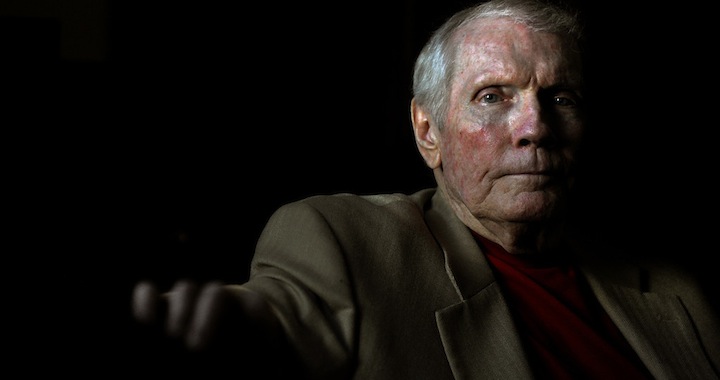I know I should not let this guy get to me.
The first time I heard of Fred Phelps was during media coverage of the 1998 funeral for Matthew Shepard, a 21-year-old gay man who’d been murdered. Phelps leads the Topeka-based group that calls themselves “Westboro Baptist Church.” WBC, unaffiliated with any recognized Christian denomination, has garnered the national news spotlight for picketing the funerals of gay people and soldiers. When the fringe group, which consists mostly of Phelps’ family members, had announced plans to picket the December 11 funeral of Elizabeth Edwards in Raleigh, North Carolina, I couldn’t imagine what sort of secret life Edwards must have been leading to elicit their ire. Apparently the group points the finger at Edwards for the automobile death of her teenage son in 1996 and, most recently, for her affliction with breast cancer. Then last week, when the group made plans to picket the funeral of 9-year-old Tuscon shooting victim Christina Green, who’d been killed in the crossfire aimed at Congresswoman Gabrielle Giffords, I was reminded once again that these folks will show up anywhere they’ll get media attention. So the evident lunacy is why I try not to lose too much sleep over this nonsense.
Some days, though, it gets to me.
Some days I’m more bothered than others that this hate group gets to use the word “Christian.” I’m aggravated that they’ve commandeered “church.” As a friend and family member of actual Baptists, I want to march up to the building in Topeka Kansas, where this group gathers each week, and scrape the word right off the sign.
So, on the days when I make the mistake of peeking at this stuff online, I get a little fired up.
Inevitably, my mind wanders to the inevitable funeral of Fred Phelps. Depending on what’s in the headlines, this happens more quickly on some days than on others. At some point, I began to wonder how others, like me, who’ve been impacted by Phelps’ twisted “ministry” will mark the occasion of his death. I have to suspect that there will be someone—possibly lots of someones—gathered outside of the service for Phelps’ loved ones. Whether Christian or Jewish or gay or military, I expect that there will be plenty of folks happily waving neon signs that read “God hates Fred Phelps”.
I’m not endorsing it, just imagining it.
After picturing the potentially ugly scene, my redeemed imagination kicks in. In this new vision, those of us who believe that the Father of Jesus is a Lover of the unlikely are present at Phelps’ funeral in droves. There, with our faces and bodies and voices and signs, we bear witness to the less-publicized platform that God does not, in fact, hate gay people. Rather—across devilish divides called “liberal” and “conservative”—we testify together that God actually loves gay people and soldiers. We testify that God loves 9-year old girls and women who battle breast cancer and ones who suffer adultery and ones who bear unspeakable grief. With all that we are, we point to a God who heals the brokenhearted and binds up their wounds. (Psalm 147:3, NIV) Although I don’t think God ever intended for us to communicate with one another via placards, I really want for Christians from the right, and ones from the left, to stand together to bear authentic witness to the unfathomable nature of a God who loves even the Phelps family.
Yuck, right? It’s one thing to announce that God loves the despised and the brokenhearted, but to bear witness to a God who loves the perpetrators of violence is a whole other thing. And yet, in that precise respect, it’s a decidedly Christian thing. The kind of love for one’s enemies, which Jesus ushered in, is exactly what distinguishes Christian love from the smarmy variety that too often passes as the genuine article. Though it wasn’t popular among his colleagues in the 1960s, it was particularly Christian when civil rights activist Will Campbell visited Klansmen in Mississippi prisons. Today, it is distinctly Christian when crime victims and their families gather the courage to forgive offenders. When followers of Jesus are able to stay in relationship with a teacher who’s been accused of molestation at their child’s school, their steadfast presence is a Christian act of love. When Jesus instructed his followers to love our enemies, there was no escape clause for Klansmen or convicted offenders or accused ones or even hateful religious people. Authentically Christian love must, by definition, include Fred Phelps and Westboro Baptist Church.
The witness of Jesus convinces me that as Christians begin to live Jesus’ radical Red Letter words, our message and our witness become much more powerful than any of Phelps’ ugly sandwich board ones.

